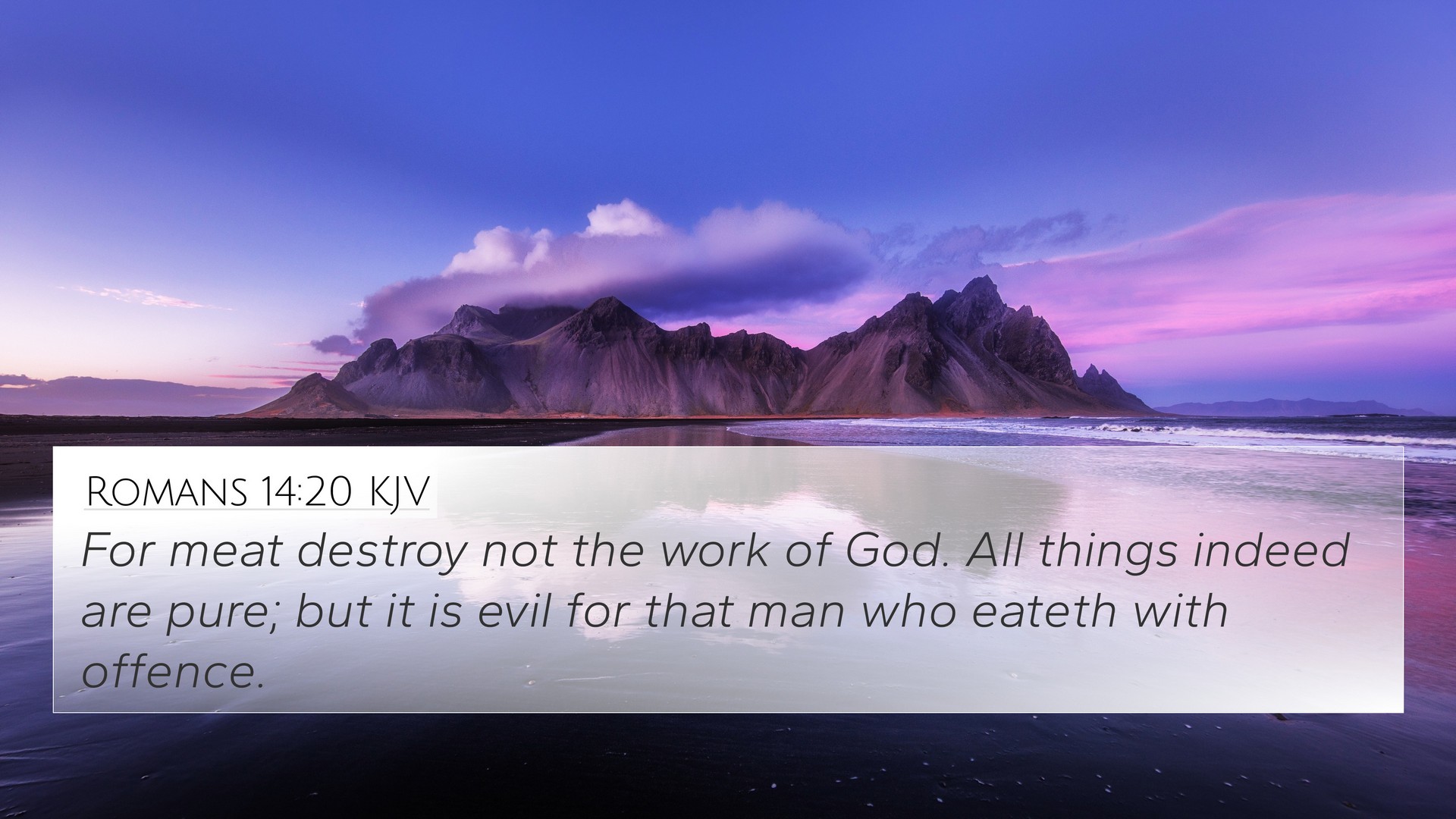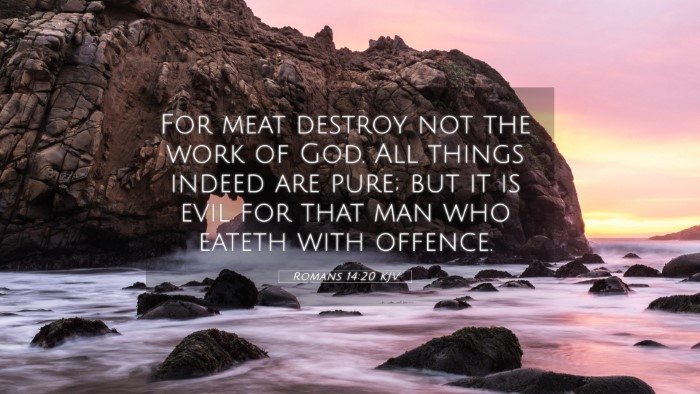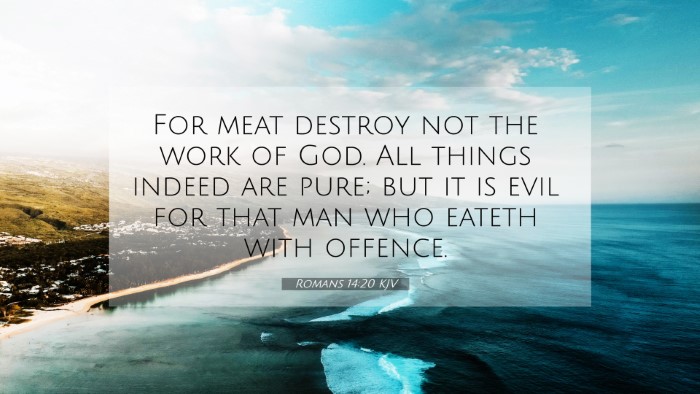Old Testament
Genesis Exodus Leviticus Numbers Deuteronomy Joshua Judges Ruth 1 Samuel 2 Samuel 1 Kings 2 Kings 1 Chronicles 2 Chronicles Ezra Nehemiah Esther Job Psalms Proverbs Ecclesiastes Song of Solomon Isaiah Jeremiah Lamentations Ezekiel Daniel Hosea Joel Amos Obadiah Jonah Micah Nahum Habakkuk Zephaniah Haggai Zechariah MalachiRomans 14:20 Similar Verses
Romans 14:20 Cross References
For meat destroy not the work of God. All things indeed are pure; but it is evil for that man who eateth with offence.
Uncover the Rich Themes and Topics of This Bible Verse
Listed below are the Bible themes associated with Romans 14:20. We invite you to explore each theme to gain deeper insights into the Scriptures.
Romans 14:20 Cross Reference Verses
This section features a detailed cross-reference designed to enrich your understanding of the Scriptures. Below, you will find carefully selected verses that echo the themes and teachings related to Romans 14:20 KJV. Click on any image to explore detailed analyses of related Bible verses and uncover deeper theological insights.
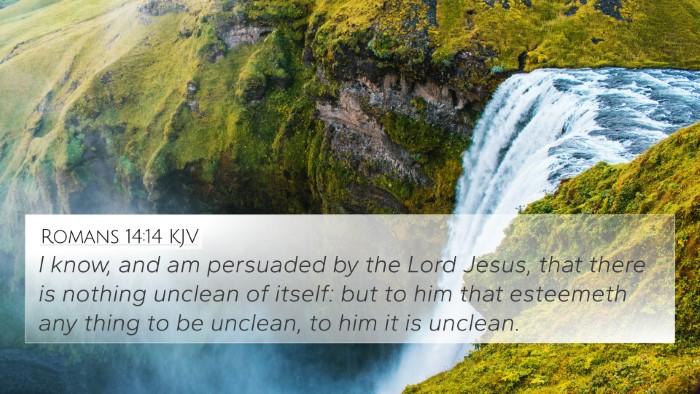
Romans 14:14 (KJV) »
I know, and am persuaded by the Lord Jesus, that there is nothing unclean of itself: but to him that esteemeth any thing to be unclean, to him it is unclean.
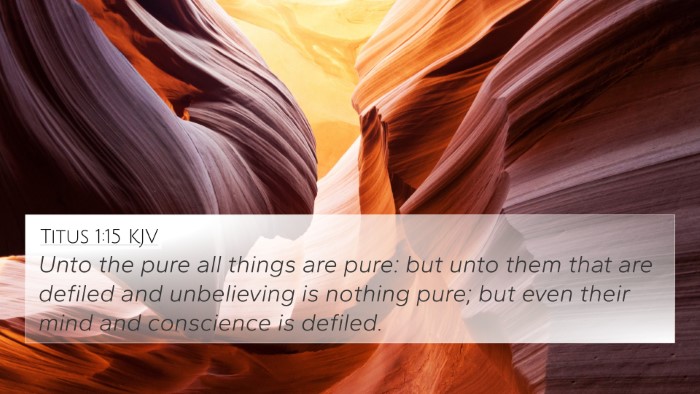
Titus 1:15 (KJV) »
Unto the pure all things are pure: but unto them that are defiled and unbelieving is nothing pure; but even their mind and conscience is defiled.
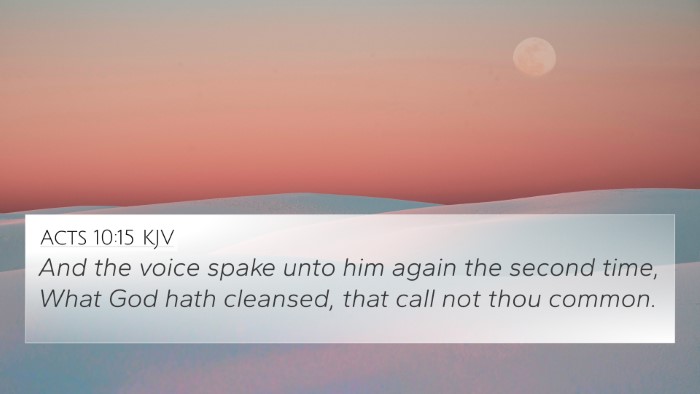
Acts 10:15 (KJV) »
And the voice spake unto him again the second time, What God hath cleansed, that call not thou common.
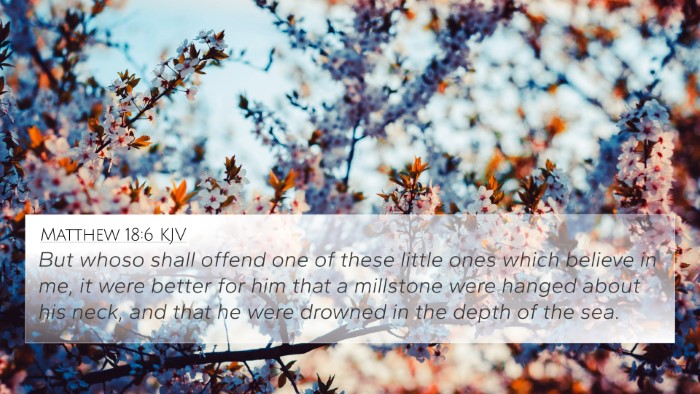
Matthew 18:6 (KJV) »
But whoso shall offend one of these little ones which believe in me, it were better for him that a millstone were hanged about his neck, and that he were drowned in the depth of the sea.
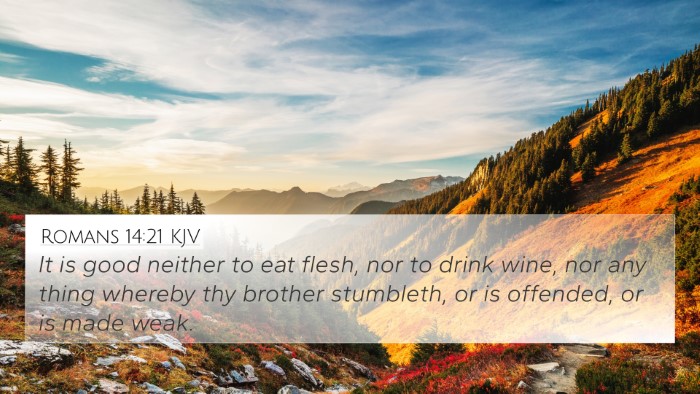
Romans 14:21 (KJV) »
It is good neither to eat flesh, nor to drink wine, nor any thing whereby thy brother stumbleth, or is offended, or is made weak.
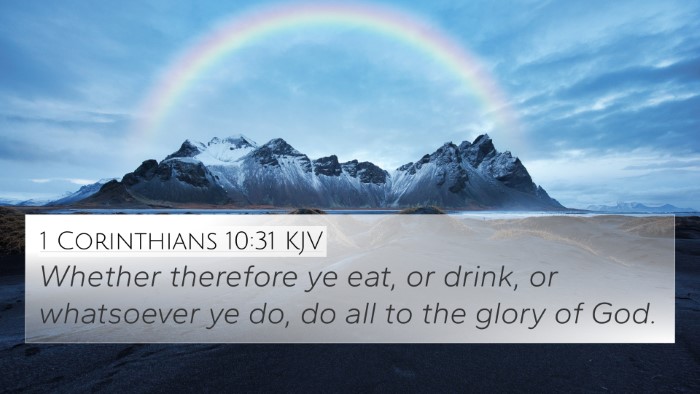
1 Corinthians 10:31 (KJV) »
Whether therefore ye eat, or drink, or whatsoever ye do, do all to the glory of God.
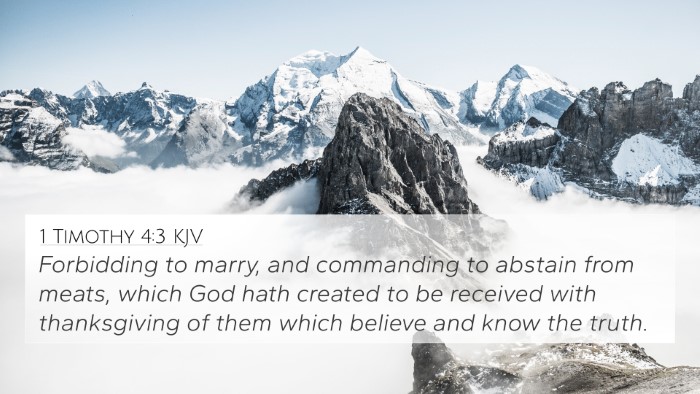
1 Timothy 4:3 (KJV) »
Forbidding to marry, and commanding to abstain from meats, which God hath created to be received with thanksgiving of them which believe and know the truth.
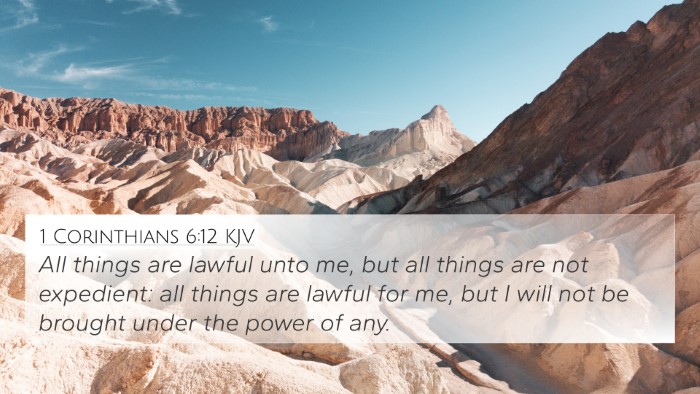
1 Corinthians 6:12 (KJV) »
All things are lawful unto me, but all things are not expedient: all things are lawful for me, but I will not be brought under the power of any.
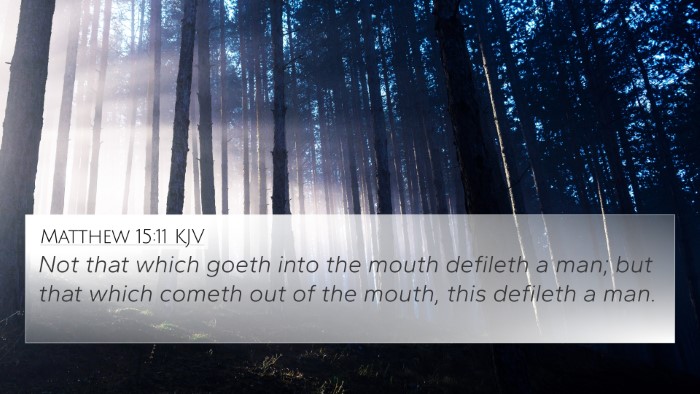
Matthew 15:11 (KJV) »
Not that which goeth into the mouth defileth a man; but that which cometh out of the mouth, this defileth a man.
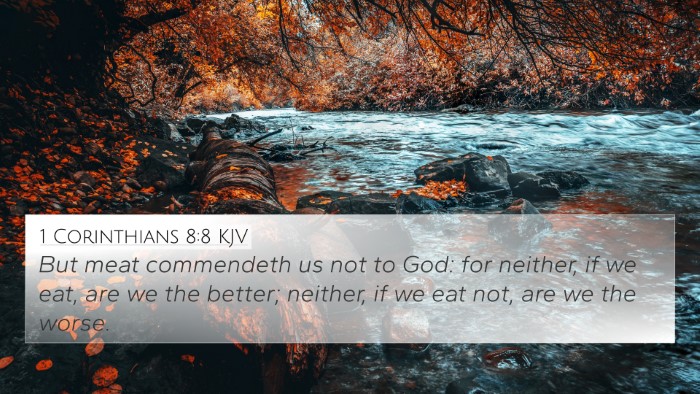
1 Corinthians 8:8 (KJV) »
But meat commendeth us not to God: for neither, if we eat, are we the better; neither, if we eat not, are we the worse.
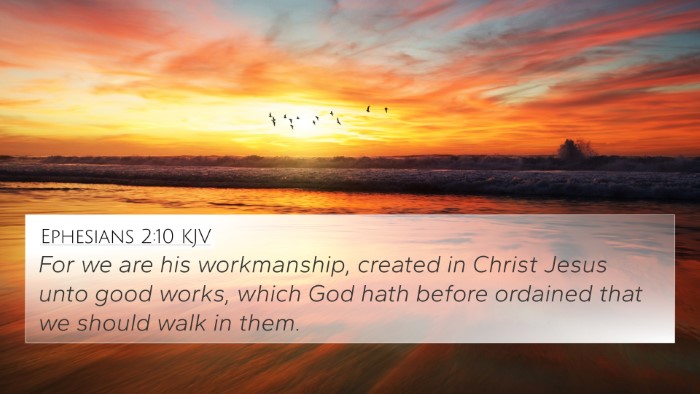
Ephesians 2:10 (KJV) »
For we are his workmanship, created in Christ Jesus unto good works, which God hath before ordained that we should walk in them.
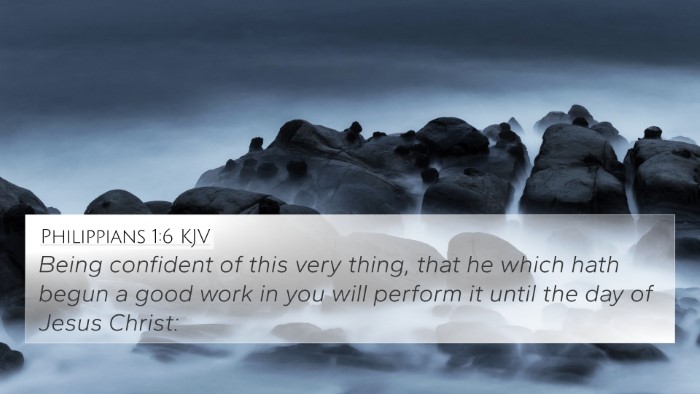
Philippians 1:6 (KJV) »
Being confident of this very thing, that he which hath begun a good work in you will perform it until the day of Jesus Christ:
Romans 14:20 Verse Analysis and Similar Verses
Understanding Romans 14:20
Verse: Romans 14:20 states, "Do not, for the sake of food, destroy the work of God. Everything is indeed clean, but it is wrong for anyone to make another stumble by what he eats."
Interpretation and Meaning
This verse addresses the issue of Christian liberty and responsibility, particularly concerning dietary practices and the relationships between believers with differing convictions.
-
Matthew Henry's Commentary:
Henry emphasizes that while Christians have the freedom to partake in all foods, they must be mindful of how their actions affect others. The “work of God” refers to the spiritual growth and unity of believers. This means that exercising one's freedom in a way that causes another believer to falter in their faith is detrimental.
-
Albert Barnes' Notes:
Barnes interprets the calling to avoid causing others to stumble as a call to love and consideration for fellow believers. He notes that while all foods are clean, the act of eating can lead to sin if it leads another to violate their conscience.
-
Adam Clarke's Commentary:
Clarke elaborates that the verse urges believers to prioritize the edification of others over their own rights. He stresses the importance of maintaining unity within the church and not allowing personal liberties to become a stumbling block for the weak.
Key Themes and Connections
This verse emphasizes the importance of love, unity, and careful consideration of others in the Christian community. It sets a precedent for understanding how personal freedoms can impact collective faith experiences. Here are some thematic biblical connections:
- 1 Corinthians 8:9: "But take care that this right of yours does not somehow become a stumbling block to the weak."
- 1 Peter 2:16: "Live as people who are free, not using your freedom as a cover-up for evil, but living as servants of God."
- Galatians 5:13: "For you were called to freedom, brothers. Only do not use your freedom as an opportunity for the flesh, but through love serve one another."
- Hebrews 10:24: "And let us consider how to stir up one another to love and good works."
- Luke 17:1: "And he said to his disciples, 'Temptations to sin are sure to come, but woe to the one through whom they come!'"
- Philippians 2:4: "Let each of you look not only to his own interests, but also to the interests of others."
- Romans 15:1: "We who are strong have an obligation to bear with the failings of the weak and not to please ourselves."
Bible Cross-References
To deepen your understanding and study of Romans 14:20, here are some suggested cross-references that further illuminate the themes presented in this verse:
- Romans 14:19: "So then let us pursue what makes for peace and for mutual upbuilding."
- 1 Corinthians 10:23: "All things are lawful, but not all things are helpful. All things are lawful, but not all things build up."
- 2 Corinthians 6:3: "We put no obstacle in anyone’s way, so that no fault may be found with our ministry."
- Galatians 6:1: "Brothers, if anyone is caught in any transgression, you who are spiritual should restore him in a spirit of gentleness."
- James 4:17: "So whoever knows the right thing to do and fails to do it, for him it is sin."
- 1 Thessalonians 5:15: "See that no one repays anyone evil for evil, but always seek to do good to one another and to everyone."
- Matthew 18:6: "But whoever causes one of these little ones who believe in me to sin, it would be better for him to have a great millstone fastened around his neck and to be drowned in the depth of the sea."
Cross-Referencing Biblical Texts
This thematic richness invites deeper study through cross-referencing. By studying passages like those listed, one can see how the call to love and responsibility permeates Biblical teaching.
Tools for Bible cross-referencing, such as concordances or dedicated guides, can enhance your understanding of key themes. Engaging in a cross-reference Bible study allows you to piece together the broader narrative of Scripture, tracing how different verses interconnect and support one another across various contexts and messages.
Conclusion
In conclusion, Romans 14:20 serves as a crucial reminder of the Christian's responsibility to one another, emphasizing that personal freedoms should never come at the cost of another's faith or well-being. The interconnectedness of Scripture invites us to delve deeper into cross-referencing to gain a richer understanding of God’s Word and His purpose for our interactions within the body of Christ.
Explore Further
For those interested in exploring the connections between Bible verses, consider the following long-tail keywords when seeking resources:
- Identifying connections between Old and New Testament
- Comparative study of Pauline epistles
- Cross-referencing Psalms with New Testament teachings
- Interpreting Biblical themes through cross-references
